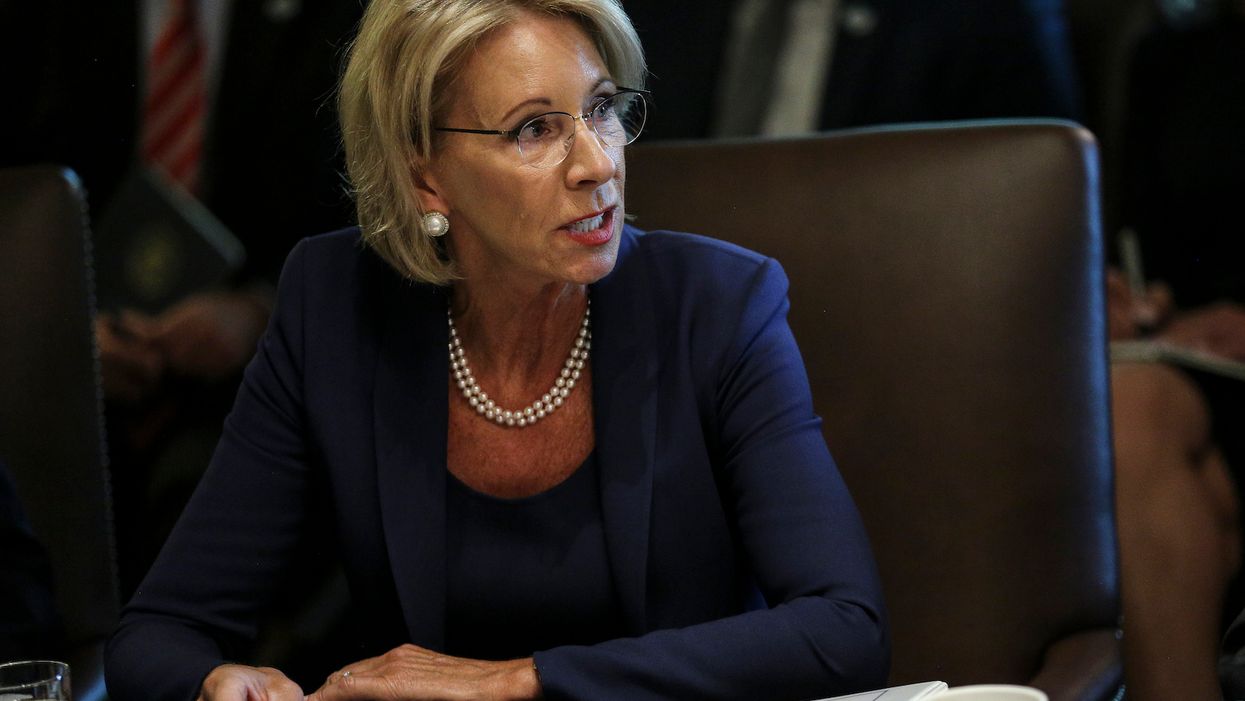
Oliver Contreras-Pool/Getty Images

The White House has already issued a veto threat
In a 231-180 vote mostly along party lines, the House of Representatives approved a resolution on Thursday to overturn a Department of Education rule on federal student loans that is projected to save taxpayers billions of dollars.
The rule in question, which was announced by Secretary of Education Betsy DeVos last year, sets more stringent standards for how student loans are forgiven under federal law in cases where people have been defrauded by colleges.
A post at Forbes explains that the new regulation is a "more reasonable standard" of proof for fraud claims against colleges than the one put in place by the Obama administration. While the Obama version said that a statement "likelihood or tendency to mislead under the circumstances" from a college could qualify someone for loan relief, the new rule says that schools have to knowingly make false statements "with reckless disregard for the truth."
Proponents of the DeVos rule say that it sets a better standard for evidence, serving as a bulwark against fraudulent claims, while saving taxpayers billions of dollars in the process.
"I called for this regulatory reset more than two years ago, as it became clear the old rules just weren't working," DeVos said in a statement in September. "We believe this final rule corrects the wrongs of the 2016 rule through common sense and carefully crafted reforms that hold colleges and universities accountable and treat students and taxpayers fairly."
As a result of the changes, the Department of Education estimates that taxpayers will save over $11 billion over a 10-year period.
At a hearing of the House Education and Labor Committee in December, committee member Greg Murphy (R-N.C.) praised DeVos for "trying to be a good steward" for her work on the borrower defense rule and "because we are striking a balance between individuals that want to better themselves to pursue higher education and also to be one that just doesn't dole out money just because someone claims that they deserve money."
The rule also sets a three-year time limit on bringing fraud claims after graduation or withdrawal, which FreedomWorks' Adam Brandon calls "both ample time and a reasonable limit to deter illegitimate claims from being filed years after the fact."
Rep. Mark Walker (R-N.C.) — who also sits on the Education and Labor Committee — told Blaze Media that getting rid of the DeVos rule would "only open the door for fraudulent claims and could even lead to the closure of some of our educational institutions."
Critics of the rule, however, say that its new standards make obtaining loan forgiveness too difficult for defrauded students.
Thursday's resolution was introduced by Rep. Susie Lee (D-Nev.) in September. Lee stated at the time that the DeVos rule "makes the process of applying for and granting borrower defense forgiveness unnecessarily difficult and burdensome for the students who we are supposed to be protecting."
Massachusetts Senator and Democratic presidential candidate Elizabeth Warren — who has made student loan issues a large part of her 2020 campaign platform — joined Lee's effort to upend the rule in October, calling it "another Trump-DeVos giveaway to the notorious for-profit colleges at the expense of defrauded student borrowers."
Under the Congressional Review Act, Congress can overturn down regulations issued by federal agencies with a joint resolution passed by both chambers. While the resolution has passed the Democrat-controlled House of Representatives, it is not likely to fare as well in the Republican-controlled Senate.
Also, the White House vowed Monday to veto the resolution, should it ever make it the president's desk, saying that it would "undermine the Administration's efforts to protect students and taxpayers."
Nate Madden
Nate is a former Congressional Correspondent at Blaze Media. Follow him on Twitter @NateOnTheHill.